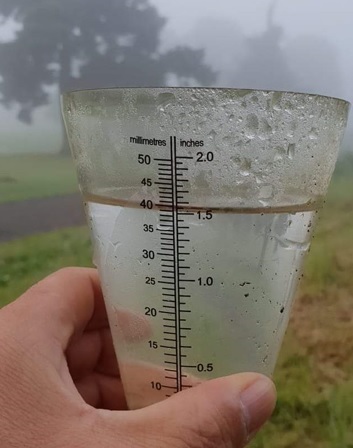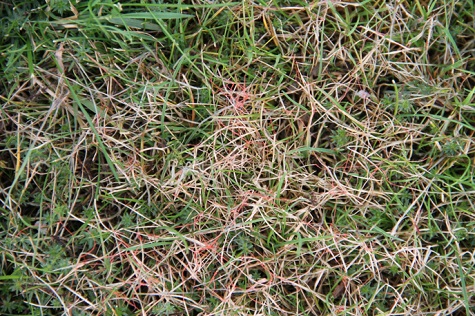Last week we finally received, in most parts of the country, some much needed rainfall that thankfully will have helped refresh many parched landscapes and sports facilities. It is surprising how quick grass recovers after a good dose of rain. Some midlands golf courses got anything between 9mm-45mm of rain in one single downpour!

HG Mal Mitchell’s rain gauge shows 40mm of rain at Patshull Park Hotel Golf & Country Club
There’s no doubt that this balmy, wet weather has influenced the incidence of some turf diseases to become prevalent, stimulating these pathogens to start their lifecycles.
The pathogens that cause these diseases are always around and often lying dormant in the thatch layers waiting for the ideal conditions in order to become active. Once these spores are activated, and have found an acceptable host, they are able to grow and reproduce themselves, spreading new spores and infections to other areas of turf. This cycle continues whilst the right conditions prevail.
Spores are spread by wind, water and by traffic. It is during periods of fluctuating weather, particularly changes in temperatures, that an outbreak of disease takes place. Attacks of soil borne disease can appear at any time of the year. Foliar diseases prefer warm humid conditions of the spring and summer months hence we are now seeing a spike in turf grass disease.
Diseases can often be difficult to control. Most IPM strategies work very well and often involve the use of fungicide treatments to help suppress potential outbreaks of disease. As a general rule, fungicide applications should be made during the first signs of attack since disease can cause substantial damage in a short period of time. In recent years there has been a decline in the use of fungicides. Recent studies have shown that constant use of fungicides often sees the disease becoming resistant to them.
Today we have many strategies that can help prevent or reduce the incidence of turf diseases. In essence, if we have a good understanding of our soils, carry out good cultural practices and work with the weather, we can usually prevent a serious outbreak of disease. Recently we have seen groundsmen and greenkeepers making good use of weather forecasting apps to help them maintain their facilities.
Companies such as Headland Amenity and Syngenta have for many years provided an excellent weather service that helps us keep an eye on disease pressure activity with their forecasts. Mark Hunt at Headland Amenity only last week predicted a spike in diseases outbreaks. This spike really applied to Microdochium nivale but also to some of the other diseases that we see at this time including Red Thread and Fairy Rings. If ever there were diseases that like humidity and temperature, it is these three and if we were on the continent, it would be joined by Dollar Spot.

Red Thread (Laetisaria fuciformis)
SPORT RESTARTS
Groundsmen and greenkeepers up and down the country have been working hard to maintain and get their facilities ready for the start of some much eagerly awaited sport. Golf has had a great start with many clubs being inundated with players getting back out on the course. It has also been reported in some golf magazines that there has been an upsurge in membership enquiries at many golf clubs.
And there seems to be a lot of interest in the shorter game (nine holes) of golf, with several clubs stipulating that players can only play nine holes to help speed up the game.

Last Wednesday saw the resumption of the long awaited conclusion of the 2019/2020 Premier League football season. After a 100-day absence because of the coronavirus pandemic, Aston Villa v Sheffield United kicked off the English top-flight with a 0-0 draw. It was the first of 92 league games that will be packed into a frantic 40 days before the season concludes on 26 July.
It will be interesting to see how it all pans out and how they cope with the social distancing measures put in place.
I am sure many Premiership groundsmen will be happy to see the sport return and be able to get back to doing what they do best.
As for other sports, horse racing seems also to be enjoying its return with Ascot delivering a full five days of racing with Frankie Dettori, no doubt trying to steal the limelight in his usual way.
The ECB have announced their road map for the return of recreational cricket and a updated guidance for return to activity in a club setting.
As for bowls clubs, Bowls England like most sporting bodies have published guidelines and information for their members.
On the parks front, Paul Rabbits the Chair of the newly formed Parks Management Forum, has sent a letter to Boris Johnson and several leading MPs to promote the value of public parks and open spaces in an effort to gain future government funding for these vital assets that have shown their true value in society during Covid-19. A copy of this letter can be seen in today’s TurfPro’s Viewpoint feature article.

WEBINARS & VIRTUAL MEETINGS
This week, I also want to mention the recent popularity of the use of webinars and virtual meetings using Zoom and Microsoft Teams plus other systems, that have become the keyway to communicate especially why we are still in lockdown.
There is no getting away from it, these new ways of communicating are going to be a thing of the future and in the long-term help save a lot of time and money and resources. I have been using these new vehicles of communication in recent meetings I have been conducting with various companies, organisations and sporting governing bodies.

The Rugby Football Union will be hosting a series of support webinars so that volunteers can gain access to information that could help their clubs. I, along with Keith Kent, will be running one of these meetings with a number of Rugby Clubs on the 2nd July between 5-7pm with clubs able to book a half hour slot to talk to Keith and myself about relevant pitch maintenance questions.
The RFU will be running further Rugby Groundsmen Connect webinars that will provide tips, advice and guidance on groundsmanship for rugby clubs.
Other similar schemes are also being implemented. Cricket clubs across England and Wales can benefit from digital skills webinars as part of a new partnership between the ECB and Google Digital Garage.
ICL have recently completed a trilogy of online webinars which explored a broad range of invasive species and offered several innovative solutions.
Invasive plants are an increasing challenge for society, not least in the non-agricultural weed control (amenity) sector. Barry Browne ICL’s landscape and industrial national sales manager and keynote speaker Dr Dan Jones, managing director of advanced invasives, were on hand to provide expert advice throughout the webinars.
The first in the series focussed on Japanese Knotweed which is perhaps the best-known invasive plant species in the UK; this is in large part a consequence of invasive knotweeds possessing a range of biological properties that make them exceedingly difficult to manage.
The webinar explored how invasive knotweed biology and ecology creates a unique set of legislative, legal and management challenges and the solutions to which require evidence-based, pragmatic solutions.
You can read more about the webinar's here.
As they say, life goes on. We will always find new ways of working. Covid-19 for all its cruelty has without doubt changed the way we now need to live and work. For some aspects it may be for the better, caring more about one another and seeing the true value of our lives.